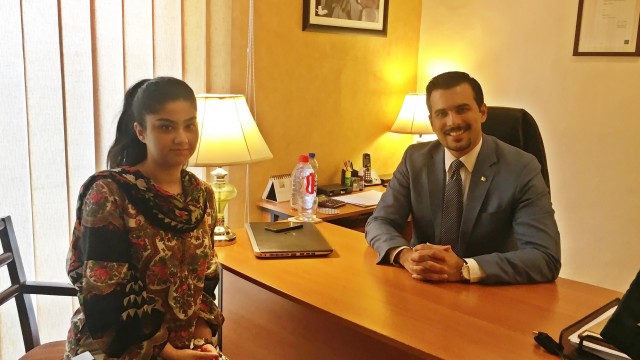In Conversation With Jamal Aziz, RSIL
Mr. Jamal Aziz joined the Research Society of International Law (RSIL) in December, 2011 and was appointed as the Executive Director in April, 2016. As Executive Director, he has the primary responsibility for the planning and management of RSIL’s operations. Through RSIL, Mr. Aziz has been actively involved in providing specialized legal advice to the Government of Pakistan and various state institutions on matters of international law, with a focus on criminal justice and national security.
Q: Please tell us about your educational background.
JA: I acquired my LLB degree through the University of London External Programmes from TILS in 2008. Then I went to University College London to pursue an LLM degree and ended up with a distinction upon completion. Shortly after, I joined the Research Society of International Law in 2011 and later began serving as its Executive Director.
Q: What motivated you to join the legal field?
JA: My decision to join the legal field took place spontaneously because initially, I was on my way to join the Pakistan Army. That is what I had in my mind since I wanted to do something on a national level and I wanted to serve my country. Unfortunately in Pakistan, the concept of career counseling is very limited so I wasn’t too aware of the options available to me in the beginning.
Q: Who do you look up to in the legal community?
JA: I look up to Mr. Ahmer Bilal Soofi who is the Founder and President of the Research Society of International Law. When I first joined RSIL, Mr. Soofi guided and helped me very much.
Q: In your opinion, what is the importance of law in areas such as Indo-Pak disputes that have majorly affected Pakistan’s foreign policy?
JA: In my opinion, what many people fail to understand is that the main issues between India and Pakistan are legal, such as the Kashmir conflict, Mumbai attacks, etc. Better efforts should be made from both governments so that such issues can be resolved while keeping the legal framework in mind and with the assistance of proper legal advisors.
Q: What advice would you like to give to prospective lawyers and law students?
JA: The CVs I receive on a daily basis seem identical. Most students have participated in moot competitions, debates, etc. I would like to suggest that they should think out of the box and do other things as well, such as publish a paper.
Q: What advice would you give to lawyers who want to pursue the practice of law but are not good at public speaking?
JA: There is more to the legal field than public speaking. The main issue in Pakistan currently is that many people can talk but can’t back it up. A lawyer should have good writing skills and a mind that can think critically.
Q: How do you see the future of Pakistan in terms of law?
JA: I’m very optimistic about Pakistan. Development is slow, but it is getting better. In order to speed up the process we need to raise more awareness about laws and perhaps have more better-trained lawyers.
The views expressed in this article are those of the authors and do not necessarily represent the views of CourtingTheLaw.com or any other organization with which they might be associated.







